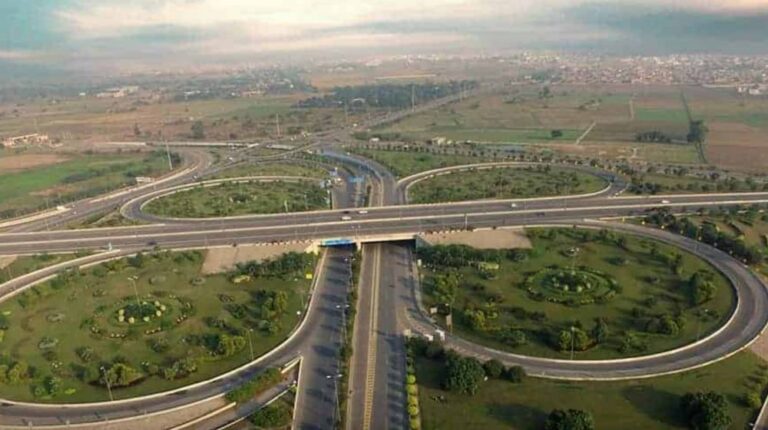Infrastructure plays a pivotal role in shaping the growth and development of urban areas. Among the recent infrastructure projects in Pakistan, the Rawalpindi Ring Road stands out as a significant endeavour aimed at enhancing connectivity and fostering economic progress.
This article explores how the Rawalpindi Ring Road enhances the value of housing societies in the region.
Overview of Rawalpindi Ring Road
The Ring Road is a mega-project designed to provide a circular route around the city, connecting various neighbourhoods, industrial areas, and commercial hubs.
With its strategic alignment and planned interchanges, the Ring Road aims to alleviate traffic congestion, reduce travel time, and spur economic activities along its corridor. The project is being implemented in multiple phases to ensure efficient execution and optimal utilization.
Impact of Rawalpindi Ring Road on Housing Societies
One of the primary beneficiaries of the Rawalpindi Ring Road is the housing sector. The improved connectivity offered by the Ring Road translates into increased accessibility for residents of housing societies located along its route.
This enhanced accessibility, coupled with the promise of reduced commuting time, adds significant value to properties in these societies. As a result, real estate developers are witnessing heightened interest and demand for residential units in these areas, leading to a surge in property prices and investments.
- Economic Growth and Development
- Improvement in Infrastructure
- Quality of Life Enhancement
1. Economic Growth and Development
The construction of the Rawalpindi Ring Road serves as a catalyst for economic growth and development in the region. By improving connectivity between different parts of the city and facilitating smoother movement of goods and services, the Ring Road stimulates local economic activities.
Furthermore, the project creates employment opportunities both directly through construction jobs and indirectly through induced economic activities, thereby contributing to job creation and socio-economic development.
2. Improvement in Infrastructure
Apart from enhancing connectivity, the Ring Road project also entails significant improvements in infrastructure along its corridor. This includes the expansion and upgrade of existing road networks, provision of utilities and amenities, and implementation of urban planning initiatives.
Moreover, such infrastructure enhancements not only improve the overall quality of life for residents but also attract further investments in the area, fueling additional development and growth.
3. Quality of Life Enhancement
One of the immediate benefits of the Ring Road is the reduction in traffic congestion within the city. As traffic flow improves and commute times decrease, residents experience a noticeable enhancement in their quality of life.
Moreover, the project aims to address environmental concerns by incorporating eco-friendly features and promoting sustainable transportation practices. These efforts contribute to cleaner air, less noise pollution, and overall improved living standards for the community.
Housing Societies Near Rawalpindi Ring Road
As discussed Rawalpindi Ring Road is a game changer for the people of Rawalpindi and Islamabad as well. Especially, the housing sector will benefit a lot from this connectivity. Now there are a number of housing societies near Ring Road, and due to the easy access, these societies are in high demand.
If you are someone looking for a housing society near the Ring Road, there are many good options for you. Some of the best housing societies nearby are:
- Rudn Enclave
- Airport Housing Society
- DHA Islamabad – Rawalpindi River View South (Phase 4)
- Bahria Town Phase 8 Extension
- Faisal Town Phase 2
- Capital Smart City
If you are looking for detailed information about these housing societies near Rawalpindi Ring Road click on this link and get the information you need.
4. Challenges and Concerns
Despite its numerous benefits, the construction of the Ring Road is not without challenges. Environmental concerns, such as land degradation and habitat loss, need to be carefully addressed through proper planning and mitigation measures.
Additionally, the process of land acquisition for the project has faced resistance from some affected communities, highlighting the importance of effective stakeholder engagement and conflict resolution mechanisms.
5. Government Initiatives and Support
The successful implementation of the Ring Road project underscores the significance of government initiatives and support in infrastructure development. Through strategic planning, resource allocation, and collaboration with private sector partners, the government plays a crucial role in realizing such transformative projects.
Moreover, a robust regulatory framework ensures transparency, accountability, and adherence to environmental and social standards throughout the project lifecycle.
The Future of Rawalpindi Ring Road and Nearby Housing Societies
Looking ahead, the Ring Road project holds immense promise for the future development of the region. As additional phases are completed and new segments are integrated into the network, the project is expected to further enhance connectivity, stimulate economic growth, and promote sustainable urbanization.
By embracing innovation and stakeholder collaboration, the Ring Road paves the way for a brighter and more prosperous future for Rawalpindi and its residents.
Conclusion
The Rawalpindi Ring Road emerges as a transformative infrastructure project with far-reaching implications for housing societies and the wider community. By improving connectivity, stimulating economic growth, and enhancing the overall quality of life, the Ring Road contributes to the sustainable development and prosperity of the region.
As stakeholders continue to collaborate and innovate, the full potential of the Ring Road as a driver of positive change can be realised.
FAQs
The Rawalpindi Ring Road project is currently under construction, with various phases at different stages of development. Significant progress has been made, but completion timelines may vary depending on ongoing construction activities and any unforeseen challenges.
The Rawalpindi Ring Road project is a major infrastructure initiative aimed at creating a circular route around the city of Rawalpindi in Pakistan. It is designed to improve connectivity, reduce traffic congestion, and stimulate economic growth by providing an efficient transportation corridor.
The exact cost of the Rawalpindi Ring Road project may vary depending on factors such as land acquisition, construction materials, and labour costs. However, it is a significant investment by the government aimed at enhancing urban infrastructure and fostering socio-economic development.
The Lahore Ring Road is approximately 85 kilometres long, forming a semi-circle around the city of Lahore in Punjab, Pakistan. It serves as a vital arterial route, connecting various parts of the city and facilitating smoother movement of traffic and goods.



